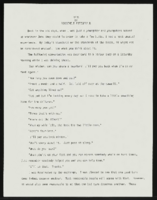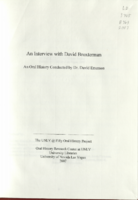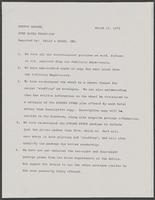Search the Special Collections and Archives Portal
Search Results

Theodore Parsons' business card for Ted Parsons Agency Incorporated in Garland, Texas, image 002
Description
Kent Carmichael oral history interview
Identifier
Abstract
Oral history interview with Kent Carmichael conducted by Stefani Evans on November 25 and December 2, 2019 for the Boyer Early Las Vegas Oral History Project.
In the first session of this oral history, Carmichael discusses his early career in lighting design and maintenance from his start at Interstate Neon to his work in the 1950s and 60s in Las Vegas. He discusses some of the iconic signs he built including the Casino Center, Carnival Room, Thunderbird, The Frontier, Bonanza, and the Stardust. He also details the technology and inner workings of these innovative signs including the transition from mechanical to electrically controlled signage. Carmichael continues to discuss Native American laborers and various individuals that he interacted with throughout his early career including Max and Mo Oggenblick, Doby Doc, Benny Binion, Arby Alper, Steve Wynn, Peter Arp, and Wayne and Jerry Newton. Carmichael ends the first interview by recalling a high wind event that damaged the Frontier sign and his efforts to bring the sign under control and repair it as well as his vision and behind the Stardust sign.
The second oral history interview contains Carmichael’s discussion of his career from 1968 onward. He immediately picks up discussion of the Stardust sign and his transition to desk work. Carmichael details the challenge and limitations of designing the International sign (the Westgate as of 2021). He describes the development of his first messenger sign for the International and the time consuming task of using tape to program the sign. He fondly remembers working on the Holiday Inn Riverboat signs, and International transition to Las Vegas Hilton and the Hilton’s transition from blue to red letters. Carmichael shares the story of being caught between organized crime and a young Steve Wynn. He recounts his last project for Ad Art, developing and construction the sign for the Louisiana Superdome in New Orleans, Louisiana. He details working through legislative and construction issues as well as the fallout from the Nat Kiefer Commission.
After leaving Ad Art Carmichael began working with Heath and Co. and began collaborating with Raul Rodriguez. Carmichael and Rodriguez went on to design some of the most enduring and visually unique signs in Las Vegas including, the Flamingo, Four Queens, Golden Nugget, Dunes Hotel, and the Desert Inn. They also worked in Reno on Circus Circus and El Dorado. Carmichael also details his interior work including the main pylon and interior signs for MGM Grand; 1974 renovation Golden Nugget, suspended stained glass ceiling at Tropicana, and the MGM Lion display. Lastly Carmichael outlined his work with Young Electric Sign 1983-85 and the Dewey Sign Company including the Las Vegas Convention Center sign. He ends by sharing his views on the role and importance of lighting in Las Vegas.
Archival Collection
Dennis McBride LGBTQ Poster and Sign Collection
Identifier
Abstract
The Dennis McBride LGBTQ Poster and Sign Collection (1977-2018) contains posters and signs created by the Las Vegas, Nevada Lesbian, Gay, Bisexual, Transgender, and Queer/Questioning (LGBTQ) community, collected by historian Dennis McBride. These handmade and commercially printed signs cover events of particular interest to the Las Vegas, Nevada LGBTQ community, including social events, entertainment venues, political rallies, and Gay Pride events.
Archival Collection

Patricia Vazquez interview, November 14, 2018, June 14, 2019: transcript
Date
Archival Collection
Description
Session 1: Interviewed by Marcela Rodriguez-Campo. Barbara Tabach also participates in the questioning. Session 2: Interviewed by Rodrigo Vazquez. Monserrath Hernandez also participates in the questioning. Patricia Vazquez was born and raised in Las Vegas, NV and shares her experiences growing up in the Valley as a Queer Latina. At a young age, she remembers traveling back and forth between Mexico and the U.S. to visit family. When she started school she shares how her home language, Spanish, became her family's "secret language" as she began to learn English. During elementary school Patricia was tracked into the special education program, and remove from the mainstream classroom. She would find her love for learning in books and libraries as she taught herself how to read in English. Despite being tracked into less advanced courses, Patricia would end up taking AP/ Honors courses in high school after forging her favorite teachers signature, which changed her educational trajectory. After coming out to her family, Patricia went nearly a decade distanced from her mother and continued her college education at Arizona State University. There, she would complete a bachelors in painting and a masters in comparative literature. Her work with the Chicano Studies program at ASU helped her develop her Chicana identity and begin her involvement in social activism. In Las Vegas, she worked to fight for marriage equality and LGBTQ rights with the American Civil Liberties Union , and later with the Progressive Leadership Alliance of Nevada. She also conducted several lectures for the Latino Youth Leadership Conference on sexuality, gender, and homophobia for over a decade. She has served as an English Professor at the College of Southern Nevada for the last 20 years and is an avid hiker, traveler, and painter.
Text

"Reds": article draft by Roosevelt Fitzgerald
Date
Archival Collection
Description
From the Roosevelt Fitzgerald Professional Papers (MS-01082) -- Drafts for the Las Vegas Sentinel Voice file. On Americans welcoming Russians with VIP treatment, while minorities continue to be mistreated.
Text

Transcript of interview with David Broxterman by Dr. David Emerson, October 24, 2007
Date
Archival Collection
Description
Text




